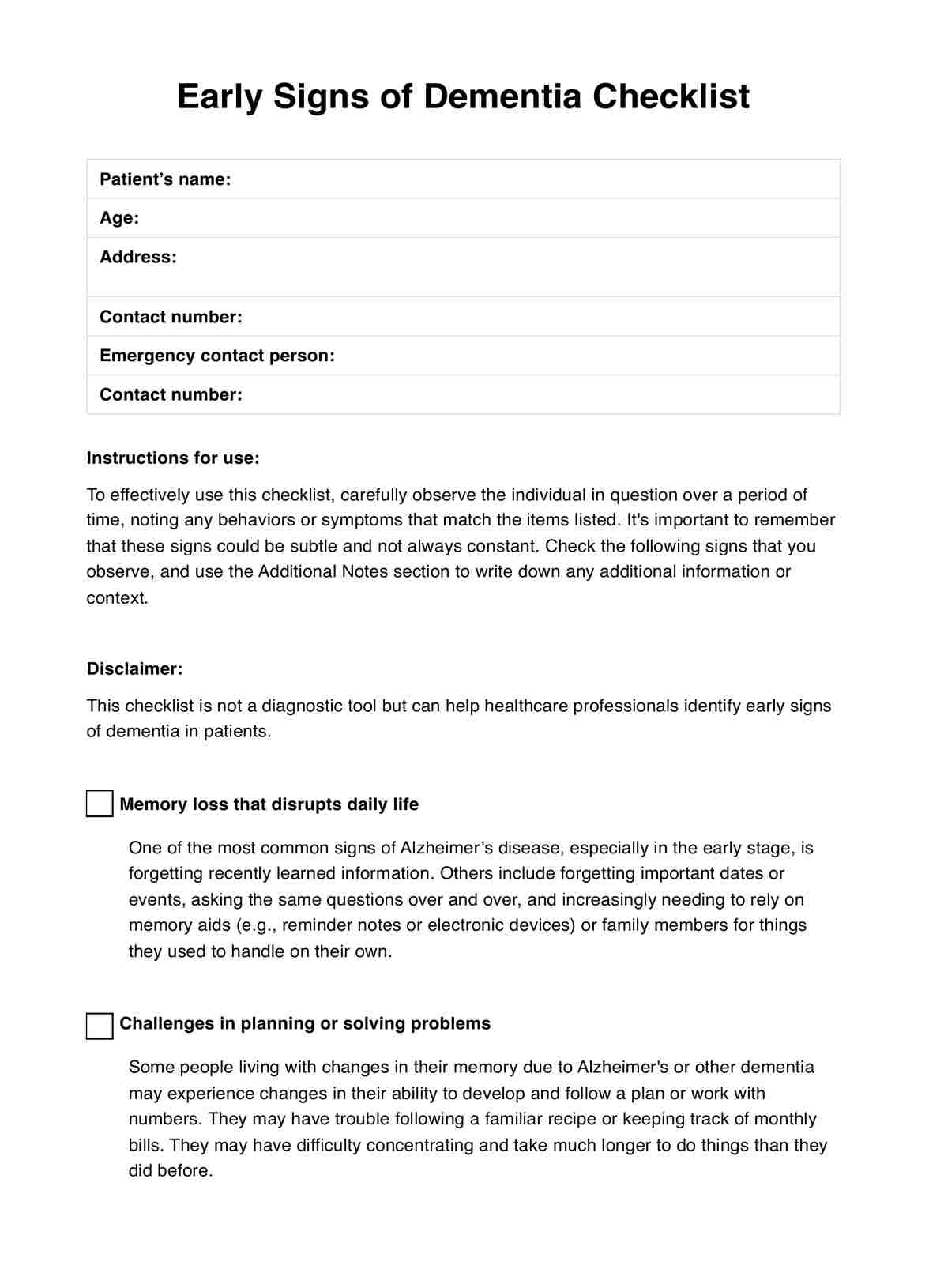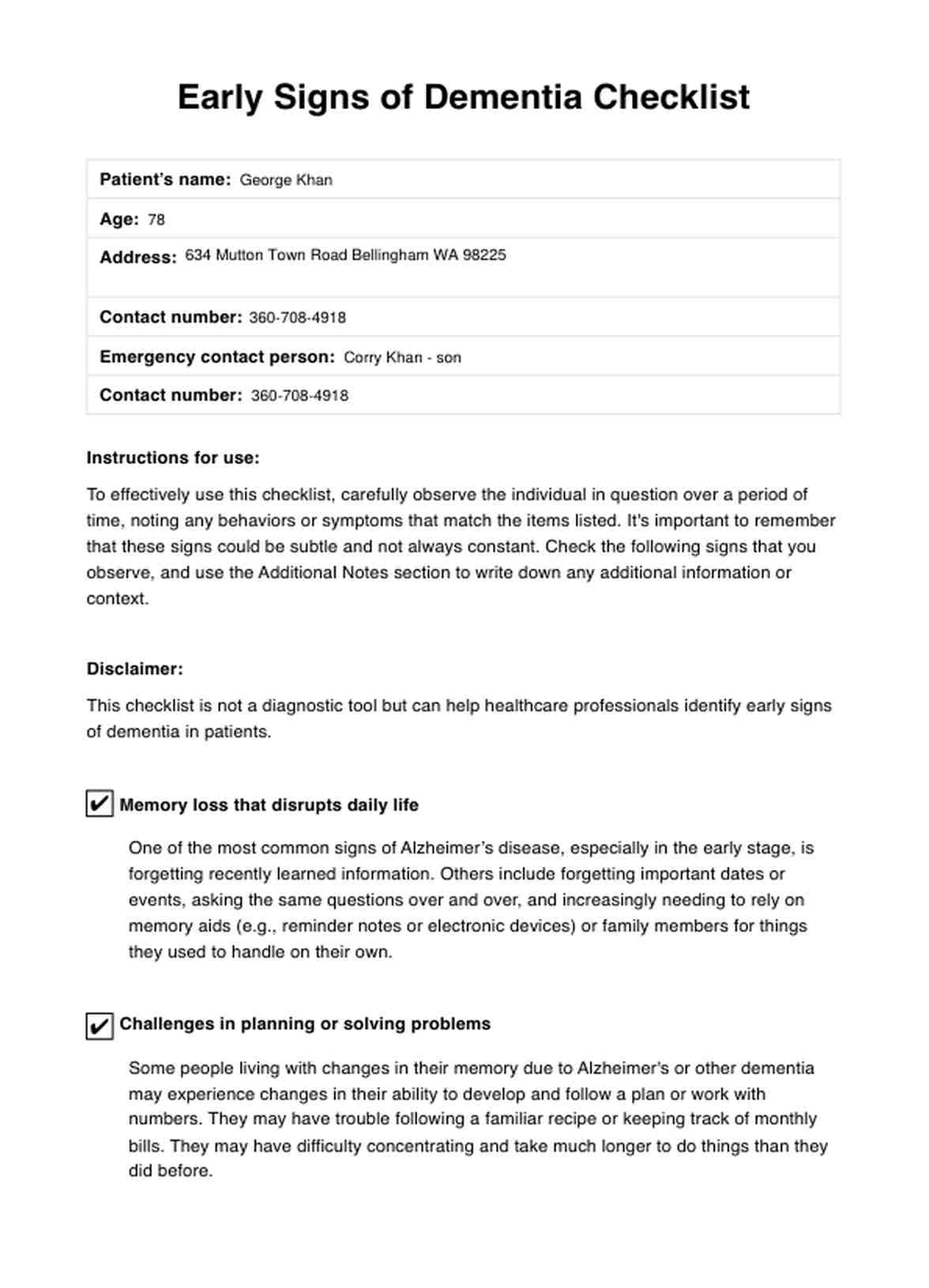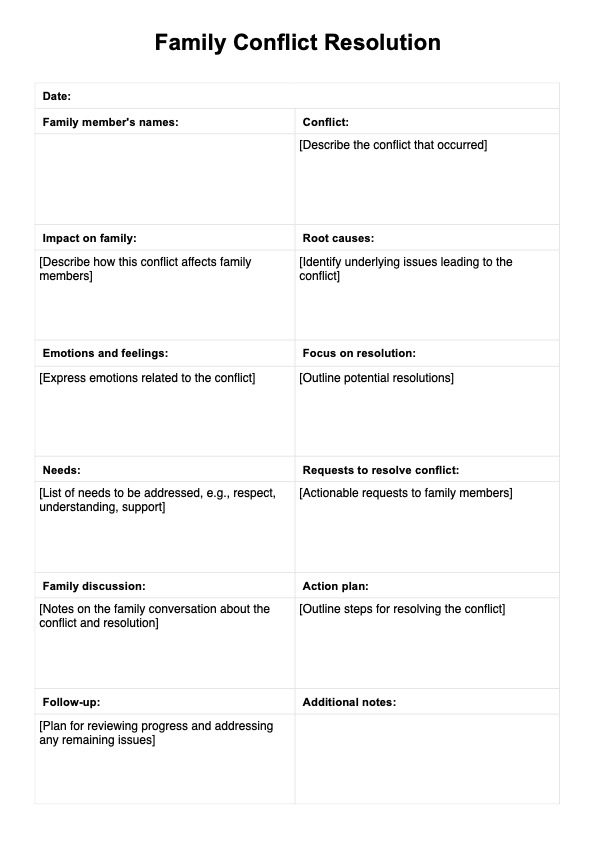Early Signs of Dementia Checklist
Understand dementia and use our Early Signs of Dementia Checklist to track symptoms. Download the free PDF template now.


Understanding dementia
Dementia is a general term that describes various symptoms affecting cognitive functioning, such as memory, communication, and thinking skills. It is not a specific disease but rather a set of symptoms caused by various underlying conditions or diseases.
Some common types of dementia include Alzheimer's disease, vascular dementia, Lewy body dementia, frontotemporal dementia, and mixed dementia. Each type has its unique characteristics and causes, but they all share a common feature - a decline in cognitive abilities that interfere with daily activities.
Dementia is most commonly seen in older adults, but it can also affect younger people. According to the World Health Organization, an estimated 55 million people worldwide are living with dementia, and this number is expected to triple by 2050 as the population ages.
While there is currently no cure for dementia, early detection and treatment can help slow its progression and improve the quality of life for those affected. Understanding the different types of dementia, their causes, and how they are diagnosed can help manage the symptoms and provide appropriate care.
Early Signs of Dementia Checklist Template
Early Signs of Dementia Checklist Example
Types of dementia
As mentioned, there are several types of dementia, each with unique characteristics. Here are common types of dementia in detail:
Alzheimer's disease
Alzheimer's disease is the most common type of dementia, accounting for about 60-80% of cases. It is a progressive brain disorder that gradually destroys memory and cognitive functions.
The exact cause of Alzheimer's is still unknown, but it is believed to be caused by a combination of genetic, environmental, and lifestyle factors. There is currently no cure for Alzheimer's disease, but medications and therapies can help manage symptoms and improve quality of life.
Vascular dementia
Vascular dementia is the second most common type of dementia, accounting for about 10% of cases. It is caused by reduced blood flow to the brain, often due to stroke or other conditions that affect blood vessels in the brain.
Lewy body dementia
Lewy body dementia is a type of progressive dementia that is caused by abnormal protein deposits in the brain. It accounts for about 5% of cases and shares many similarities with both Alzheimer's and Parkinson's disease.
Frontotemporal dementia
Frontotemporal dementia is a group of conditions characterized by the degeneration of nerve cells in the frontal and temporal lobes of the brain. It accounts for about 5% of cases and typically affects younger individuals compared to other types of dementia.
Mixed dementia
Mixed dementia refers to a combination of two or more types of dementia, most commonly Alzheimer's and vascular dementia. It accounts for about 30% of all cases and can present a mix of symptoms from each type.
Creutzfeldt-Jakob disease
Creutzfeldt-Jakob disease (CJD) is a rare and fatal brain disorder that affects about 1 in every 1 million people worldwide. It is caused by abnormal proteins called prions, which can damage nerve cells in the brain.
Early symptoms of dementia
Early symptoms of dementia can vary widely among individuals, but they often include subtle changes that can be easily overlooked. Recognizing these warning signs is crucial for early diagnosis and intervention. Some of the common early-onset dementia warning signs may include:
- Mild cognitive impairment: This may present as slight changes in cognitive functions, including memory, that are not severe enough to interfere with daily life but are noticeable to the person affected or those close to them.
- Occasionally forget appointments: Forgetting dates or commitments occasionally, which can escalate over time.
- Forgetting simple words: Struggling to recall common words or using incorrect or nonspecific words in conversation.
- Cognitive decline: Observing a gradual decrease in cognitive abilities beyond what might be expected from normal aging.
- Searching for the right word: Taking longer than usual to find the right word during conversations or failing to do so entirely.
Recognizing these signs early and consulting a healthcare professional can be instrumental in diagnosing dementia and managing its progression. To learn more about the ten early signs of dementia, download our Early Signs of Dementia Checklist.
Diagnosing dementia
To diagnose dementia, doctors typically start with a thorough medical history and physical examination. They may also conduct various tests to assess memory, cognitive function, and daily functioning. These tests may include:
- Mini-Mental State Examination (MMSE): A widely used cognitive screening test that evaluates memory, attention, language skills, and other mental abilities.
- Blood tests: To rule out other potential causes of cognitive decline, such as vitamin deficiencies or thyroid problems.
- Brain imaging: Magnetic resonance imaging (MRI) or computed tomography (CT) scans can help identify structural changes in the brain contributing to dementia symptoms.
- Neuropsychological testing: This comprehensive evaluation assesses various aspects of cognitive function, including memory, language, attention, and problem-solving abilities.
Catching dementia at the early stages allows for better management of symptoms and can delay its progression. Understanding common early symptoms and seeking medical help is crucial in maintaining a good quality of life for individuals with dementia.
Reference
World Health Organization. (2023, March 15). Dementia. World Health Organization. https://www.who.int/news-room/fact-sheets/detail/dementia
Commonly asked questions
Common early symptoms of early onset dementia may involve memory loss affecting daily life, challenges in problem-solving, difficulty with familiar tasks, confusion about time or place, trouble with visual images, new issues with speech or writing, misplacing items, decreased judgment, withdrawal from activities, and mood/personality changes.
Although some memory changes might be a part of the normal aging process, dementia is not considered a normal part of aging. It is caused by damage to brain cells and can affect people in various ways, depending on the area of the brain affected. Dementia leads to individuals tending to forget simple words, declining memory, and decreasing thinking abilities, significantly impairing a person’s daily functioning.
Diagnosing brain disorders related to dementia in the early stage typically involves a comprehensive assessment that includes a detailed medical history, neurologic and cognitive tests, blood tests, and brain imaging studies such as MRI or CT scans. These diagnostic tools help doctors rule out other conditions that may mimic dementia and determine the specific type, providing a basis for personalized treatment planning.





















-template.jpg)






















































































